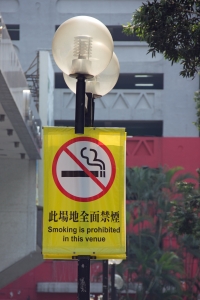

The fight against software patents has been a success in recent years, especially last year. Weeks ago we published a long article bemoaning the propaganda from patent lawyers and their sites, including so-called 'news' sites (teaching them a biased, echo chamber-like reality with 'tricks' for fooling the patent system). These people wish to tell software companies and programmers something like "thank you for smoking" with a slant; "thank you for hiring us to bamboozle the system into granting another software patent" would be their motto.
"Patent lawyers already lost the battle when it comes to rationalising software patents (even software professionals hate patents), so now they resort to a strategy which portrays software patents as easy to obtain, easy to win legal battles with, and hence worth obtaining."It may come to some as surprising that many patent lawyers actually follow Techrights and some appreciate it for the unique angle. Some really hate it and leave abusive comments with the word "poo-poo" in them (these comments come from patent firms).
Today we wish to highlight this report about Alice v. CLS Bank being used in an attempt to kill a software patent. As Law 360 put it, "Cloud-storage company Box Inc. urged a California federal judge on Wednesday to rule that certain claims of several Open Text SA collaboration software patents that Box allegedly infringed are invalid under the U.S. Supreme Court's Alice ruling because they simply computerize an abstract concept."
Another law-oriented site wrote a pro-software patents analysis. They seem to be missing a lot of the recent cases where software patents were successfully thwarted using Alice v. CLS Bank. Well, the lawyers' Web sites select only/mostly cases where software patents remain standing. To quote National Law Review : "In another hopeful sign that “the exception won’t swallow the rule”, the Central District of California has refused to apply Alice to invalidate a software patent – U.S. Patent No. 8,393,969 – for player tracking in a gaming establishment. In this case, Ameranth_ Inc. v. Genesis Gaming Solutions_ Inc, case number 8:11-cv-00189, the defendants filed a motion for Summary Judgment of Patent Invalidity of the ’969 Patent. Defendants asked the Court to rule that the asserted claims of the ’969 Patent fail 35 U.S.C.€§ 101 because they are directed to the abstract idea of a customer loyalty program directed to poker players, without adding significantly more to that abstract idea."
The bias (by selection) can be seen not just in pro-patents news sites but also the patent 'industry'. Some new examples all come from the pro-software patents crowd, i.e. patent lawyers. Consider [1, 2, 3, 4, 5, 6, 7].
We have said it before and it is worth repeating. Do not be misled by the pro-software patents propaganda that floods the press these days. They are squirming to turn back time and return to their oasis of easy patent application and litigation using mere abstract ideas (like some action "on a computer" or "over the Internet"). They are losing the battle because practicing entities have gotten fed up and they are now vocal about it (examples from today).
Proponents of software patents are not software professionals. In fact almost always, perhaps more than 90% of the time, this perverted view is promoted by patent lawyers, not by scientists. So it's a war between makers and the parasites, to generalise just a little. Patent lawyers already lost the battle when it comes to rationalising software patents (even software professionals hate patents), so now they resort to a strategy which portrays software patents as easy to obtain, easy to win legal battles with, and hence worth obtaining. The very opposite is true, as we shall show in the next post about patents and their decreased potential. ⬆